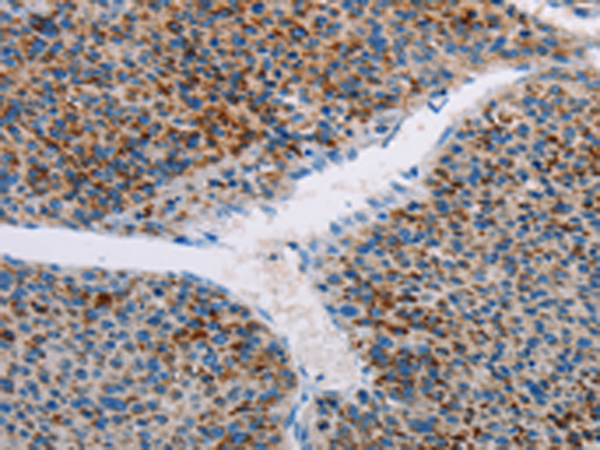
| WB | 咨询技术 | Human,Mouse,Rat |
| IF | 咨询技术 | Human,Mouse,Rat |
| IHC | 1/25-1/100 | Human,Mouse,Rat |
| ICC | 技术咨询 | Human,Mouse,Rat |
| FCM | 咨询技术 | Human,Mouse,Rat |
| Elisa | 1/2000-1/5000 | Human,Mouse,Rat |
| Aliases | LCCP |
| Host/Isotype | Rabbit IgG |
| Antibody Type | Primary antibody |
| Storage | Store at 4°C short term. Aliquot and store at -20°C long term. Avoid freeze/thaw cycles. |
| Species Reactivity | Human, Mouse, Rat |
| Immunogen | Fusion protein of human AMOTL2 |
| Formulation | Purified antibody in PBS with 0.05% sodium azide and 50% glycerol. |
+ +
以下是关于AMOTL2抗体的3-4篇文献的简要信息:
1. **文献名称**:*"AMOTL2 interacts with the Hippo effector YAP and inhibits its transcriptional activity"*
**作者**:Chan SW, et al.
**摘要**:研究揭示了AMOTL2通过结合Hippo通路下游效应因子YAP,抑制其转录活性,调控细胞增殖和器官大小。实验中利用AMOTL2抗体进行免疫共沉淀和免疫荧光,证实其在细胞核-质分布中的作用。
2. **文献名称**:*"Angiomotin-like protein 2 regulates endothelial cell migration and tube formation"*
**作者**:Bratt A, et al.
**摘要**:探讨AMOTL2在内皮细胞迁移和血管生成中的功能,通过抗体阻断实验发现AMOTL2抑制细胞迁移,并影响VEGF信号通路,提示其作为血管稳态的潜在调控因子。
3. **文献名称**:*"AMOTL2 stabilizes apical junctions and limits TGFβ signaling in epithelial cells"*
**作者**:Wells CD, et al.
**摘要**:研究发现AMOTL2通过维持上皮细胞顶端的紧密连接结构,抑制TGFβ信号通路激活。使用AMOTL2抗体进行免疫组化,显示其在细胞连接处的特异性定位及功能关联。
4. **文献名称**:*"Proteomic analysis identifies AMOTL2 as a tumor suppressor protein antagonizing oncogenic YAP"*
**作者**:Zhao B, et al.
**摘要**:通过蛋白质组学筛选发现AMOTL2与YAP相互作用并抑制其致癌活性,实验中使用AMOTL2抗体验证其在多种癌症组织中的表达下调,提示其作为抑癌因子的潜力。
这些文献均涉及AMOTL2抗体在机制研究中的应用,涵盖Hippo信号、血管生成、上皮极性及肿瘤抑制等方向。
The AMOTL2 (Angiomotin-like protein 2) antibody is a research tool designed to detect AMOTL2. a member of the angiomotin protein family involved in cell polarity, migration, and angiogenesis. AMOTL2 contains conserved coiled-coil and PDZ-binding domains, enabling interactions with cytoskeletal components and signaling molecules like YAP/TAZ in the Hippo pathway. It regulates cell-cell adhesion, actin dynamics, and organ size control by modulating Hippo-mediated transcriptional activity. Studies implicate AMOTL2 in embryonic development, tissue homeostasis, and cancer progression, though its role remains debated—some reports suggest tumor-suppressive functions, while others link its overexpression to metastasis.
The antibody is typically generated in rabbits or mice using immunogenic peptides or recombinant protein fragments. It is validated for applications such as Western blotting, immunohistochemistry, and immunofluorescence to study AMOTL2 expression, localization, and post-translational modifications (e.g., phosphorylation). Specificity is confirmed via knockout controls or siRNA knockdown. Researchers use AMOTL2 antibodies to explore its dual roles in physiological processes and pathologies, particularly in cancers (breast, prostate, glioblastoma) and vascular disorders. Commercial variants may differ in clonality, epitope recognition, or conjugation tags. Optimal performance depends on protocol standardization due to potential cross-reactivity with homologous family members (AMOT, AMOTL1).
×